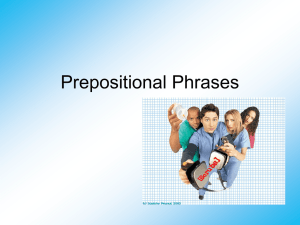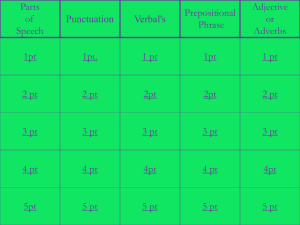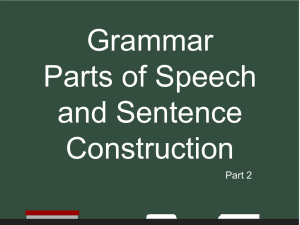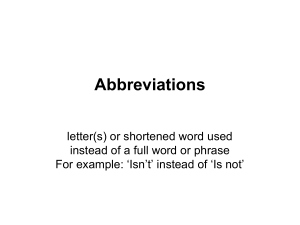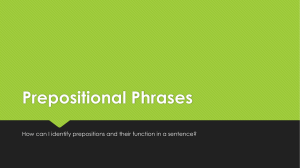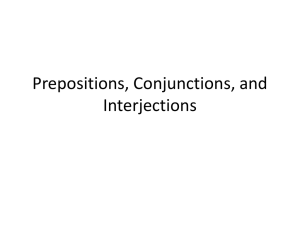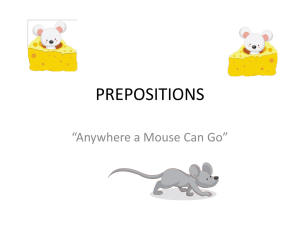Prepositional Phrases as Modifiers
advertisement
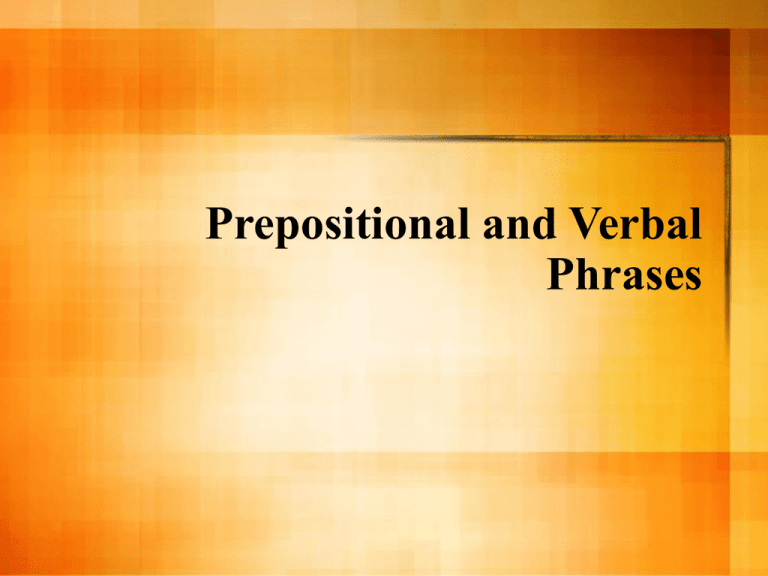
Prepositional and Verbal Phrases Preposition A word that shows the relationship between a noun or pronoun and another word in the sentence. Prepositions can be made up of more than one word Common prepositions about around beneath down In place of of over underneath above as beside during inside off past until According to Aside from besides except In spite of on since unto across at between for Instead of On account of through up after Because beyond of from into onto through up out against before but in like out to with along behind by In back of near Out of toward within among below despite In front of Next to outside under without Rules of Prepositions In a sentence a preposition is followed by the word called the object of the preposition. The object can have one or more modifiers – The opera will be performed on the stage. “on”=preposition “stage”=object of the preposition Rules con’t A preposition followed by more than one object has a compound object of the preposition. – Between City Hall and the library is the opera house. “between”=preposition “City Hall” and “library”=compound object of the preposition Rules con’t A preposition, its object(s), and any modifiers from the prepositional phrase. A phrase is a group of words that functions as a single unit. – Elena sang high notes with ease. “with”=preposition “ease”=object of the preposition “with ease”=prepositional phrase Sentences can have more than one prepositional phrase. – During the performance, we sat in back of Paul. “During”=preposition; “in back of” = preposition “performance” and “Paul”= object of the preposition “During the performance,” and “in back of Paul” = prepositional phrases Rules con’t You may have noticed that many prepositions are words that can also function as adverbs. Remember that a preposition always has an object. An adverb does NOT have an object. – We went inside the opera house. (Preposition) – We went inside. (Adverb) No object Try it Out, pg. 347 In groups of three Prepositional Phrases as Modifiers A prepositional phrase that modifies a noun or pronoun is called adjective phrase. It tells which, what kind, or how many. – Go to the beach near the road. “near”=preposition “the road”=object of the preposition “near the road”=prepositional phrase “near the road” describes “the beach” – Adjective phrase You should always place an adjective phrase next to the word it modifies. Prepositional Phrases as Modifiers A prepositional phrase that modifies a verb, an adjective, or adverb, is an adverb phrase. An adverb tells how, when, where, or to what extent. – We went on the ferry. “on”=preposition “the ferry”=object of the preposition “on the ferry”=prepositional phrase “on the ferry” tell where “we went” – Adverb Phrase Place an adverb phrase as close as possible to the word or words it modifies/ at the beginning or end of the sentence. Try it out, pg. 351 individually Choosing Correct Prepositions Between or Among? – Between: when it refers to two people, things, or groups – Among: when it refers to more than two people, things or groups Beside or Besides? Beside: means “next to” – Besides: means “in addition to” or “except for” – Verbals Verbals are when you use a word that is formed from a verb as an adjective, adverb, or a noun. – Three types: – Participles – Gerunds – Infinitives Participles A participle is a verb from used as an adjective. You can use the past participle and present participle forms as verbals. – Since participles act as adjectives, they modify nouns or pronouns. – Verb: climb, Present Participle: climbing, Past Participle: climbed. Pat’s climbing friends get together regularly. A participle can come before or after the noun/pronoun it modifies. Try it Out, pg. 359 Groups of three Participial Phrases A participial phrase is when a participle has other words within the phrase. – Amazed by his success, the scientist continued to work. This phrase modifies a noun/pronoun. – Sitting in his office, he read the book. Participial Phrases The words that complete a participial phrase may be one or more prepositional phrases. – Thomas Edison, experimenting with different methods in his laboratory, eventually improved the light bulb. Simple Subject: Thomas Edison Simple Predicate: improved “with different methods” =prepositional phrase “in his laboratory” =prepositional phrase A participial phrase may be placed before or after the word it modifies. You need to have a comma after a participial phrase that starts a sentence and to set them off from the rest of the sentence. Try it Out, pg. 362 1. 2. 3. 4. 5. 6. How could someone photograph objects moving rapidly? In the 1870s this was a serious question facing inventors. Meeting the challenge, one photographer found a solution. The photographer and his assistants worked with twenty-four cameras neatly arranged in a row along a race track. Running past the row of loaded cameras, a horse caused each camera to shoot a picture. For the first time, people saw something moving in a picture. Gerunds A gerund in the present participle of a verb (-ing form) used as a noun. In a sentence a gerund can function in all ways that a noun does. – – – Climbing is a physical activity. (Subject) I enjoy climbing. (Direct object) Today is a good day for climbing. (Object of Preposition) – My favorite activity is climbing. (Predicate Noun) Finding Gerunds A word that ends with -ing could be a verb, a participle, or a gerund. – – Find the simple subject and simple predicate Determine HOW it is being used in the sentence (as a person, place, thing or idea; as a modifier; as an action) Cora and Andy are running in tomorrow’s big race. – – – The running water overflowed. – – “Cora” “Andy” =Simple Subject “are running”=simple predicate Running is a verb “water”=simple subject “overflowed”=simple predicate Running is both a fun and healthful exercise. – – “Running”=simple subject “is”=simple predicate Try it Out, pg. 365 individual Gerund Phrases A gerund phrase consists of a gerund accompanied by an adjective, an adverb, a direct object, or a prepositional phrase. – – – – Wearing tight shoes hurts. (gerund + direct object) Long-distance running is fun. (adjective + gerund) I like dancing on ice. (gerund + prepositional phrase) Performing alone is his dream. (gerund + adverb) Functions as nouns in a sentence. – Can also be the subject, direct object, an object of a preposition, or a predicate noun. Gerund Phrases vs. Participial Phrases It is easy to confuse gerund phrases and participial phrases. – You must decide what the phrase is doing in the sentence. Singing softly was difficult. (Subject, singing is used as a noun) Singing softly, he clamed the baby. (“Singing softly” is describing “he”) We began singing the song. (“singing the song” is the direct object; “We began” what? Singing the song) The girl singing the song is Pat. “Singing the song” describes “the girl”) Try it out, pg. 368 As a class Infinitives An infinitive is made up of the word “to” and the base form of the word. – Paul wants to leave. – To exit, use the side door. “to leave” is the infinitive “to exit” is the infinitive You can use infinitives as nouns, adjective, or adverbs. – Noun: To leave would be rude. (subject) – Adjective: Now is the time to leave. (describes time) – Adverb: We are ready to leave. (describe ready) It is easy to confuse prepositions and infinitives – Remember prepositions have a direct object. Try it Out, pg. 374 As a class Infinitive phrases Made up of an infinitive and the words that complete its meaning. Can include direct objects, predicate nouns, predicate adjectives, prepositional phrases, or modifiers (infinitive) (DO) – (Infin.) (Prep. Phr.) To invent a machine is not easy to do in a hurry. Can be used as nouns, adjectives, or adverbs. Easy to confuse infinitive phrases with prepositional phrases – – Infinitive phrase= “to” + a verb Prepositional = “to” + an object
